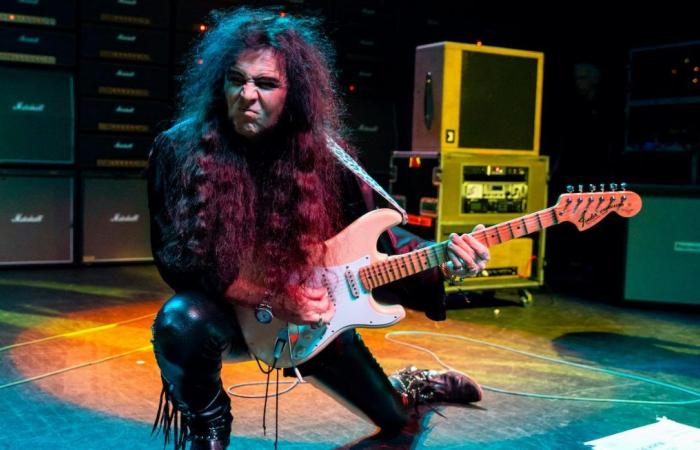In 1987 Yngwie Malmsteen is a Norse god of the six strings, a Scandinavian deity capable of hurling thunderbolts and lightning on crowds of poor mortals hypnotized and terrified by the insane speed with which he plays on his Stratocaster – not a hesitation, not a smudge – dizzying neoclassical scales taken directly from Paganini and Vivaldi and grafted onto metal bases. He is undoubtedly handsome, with his leonine hair framing a face worthy of a Lady Oscar villain and a lean, agile physique wrapped in stage clothes also worthy of Lady Oscar as he twirls on stage brandishing his guitar and stringing together a series of lightning-fast riffs on the rosewood fretboard that by the end of the performance smells almost burnt.
He has the ego and personality cult of a South American tyrant, which in the past got him kicked out of Alcatrazz, a band too small to contain two frontmen: singer Graham Bonnet, after a fierce altercation with the guitarist, fired him and replaced him with poor Steve Vai (who rightly shits himself), with the result that Malmsteen, finally free from the constraints imposed by the role of sideman that he never accepted anyway, was free to vent his guitar fury in recording projects that achieved great success, especially in the United States and Japan.
Trilogy It came out in 1986 and shocked the guitar world due to the guitarist’s style, which had now reached total maturation: heavily indebted to Bach, Vivaldi and Paganini, Malmsteen seems like the son of Ritchie Blackmore and Uli Jon Roth who fell into the potion as a child like Obelix . When my middle school classmate Alessio lends me the cassette – it’s the first time I’ve heard of this big Swedish boy – I’m stunned by the instrumental Trilogy Suite Op. 5the concretization of the very concept of virtuosity reeled off through seven minutes and a bit of neoclassical metal that seem like the perfect soundtrack to the clash with the megaboss at the end of the level. Yngwie’s technical mastery is indisputable, the speed and execution border on maniacal.
In short, in 1987 he is the Swedish god to whom all the shredding lovers who are bored with Van Halen’s tapping seem to bow down. Too bad it doesn’t last long. At the end of the ’80s grunge arrives, a subculture that sprouted in the United States that fuses hard rock, nihilism, punk aesthetics and the rough approach of do it yourself in an explosive mix that finds its trailblazers in Nirvana. Suddenly everyone wants ripped jeans and flannel shirts and Malmsteen’s baroque metal neoclassicism becomes as musically relevant as David Hasselhoff’s records. But he doesn’t give up and instead, he perseveres along his path made of minor harmonic scales played at the speed of light, (second) skin pants, more gold on him than a Romanian warlord, the Ferrari parked outside the club.
Time passes, tastes, fashions and habits change, but not Yngwie who, even 40 years after his solo debut, continues to fire notes like a Gaitling machine gun, regardless of what the critics say. Pitchforkthe record companies think of him. And there is little to say: I find his music more repetitive than an AC/DC mid-tempo, but the perseverance, obsessiveness and tenacity with which he pursues the goals of his very personal musical journey deserve unconditional respect. Of course, not everything is exactly like in the good old days: now Malmsteen no longer has the cool look of a bad guy from Interview with the Vampirebut is more reminiscent of Mickey Rourke in The Wrestler. His stage personaon which he has worked tirelessly since he was a boy, today resembles a character over the top, more cocky than a Dubai influencer who sells trading courses and more pissed off than the Gallagher brothers of the good old days. In short, he is someone you can’t help but like. And so, when during a business trip to Rome my friend Antonio De Palo says to me “oh, Malmsteen is playing at Villa Ada, shall we go?” I feel that the planets have aligned and that, at the tender age of 49, I am ready to endure the fury of Yngwie live for the first time.
Malmsteen at Villa Ada in my head sounds a bit like Thanos at the Il Gigante Shopping Center in Villasanta: a powerful fallen god who performs on a small stage in the park where Pier Francesco Pingitore filmed his 1999 comedy of the same name. mix of tragicomic epic in the air, the vague feeling that we are about to witness something that we will not easily forget. There is no backing band, the speakers play at a decent volume Iron Man of Black Sabbath for the benefit of the public, a handful of metalheads who at a glance are my age, so elderly. 90% are men who seem like special extras on the set of Sons of Anarchy. Antonio and I look like the Wish-bought versions of Johnny Depp and Benicio del Toro in Fear and Loathing in Las Vegasdramatically decontextualized, Filini and Fantozzi in rented tailcoats for the reception at Casa Serbelloni Mazzanti Viendalmare.
The lights dim and the music fades: Metal Paganini enters the scene, preceded by the usual supersonic neoclassical phrasing that is his trademark. It begins with Rising Force, No Rest for the Wicked e Soldier or at least I think: every compositional effort of the Swedish virtuoso, every song form has always seemed to me to be a framework designed more to support his solo forays than a cohesive piece of music in which the guitar is just one of the instruments involved. To make sure I don’t make a mistake I ask my neighbors, who all wear Malmsteen shirts but also respond with little conviction.
But it’s not for Malmsteen’s songs that we’re here tonight, I understand that after a short while. It’s for him. To prepare for this live show I didn’t listen to anything of his: it wouldn’t have made sense, 70% of his production seems dangerously the same to me. Instead I consulted my friend Luca Milieri. YouTuber, guitar teacher with a passion for the most dizzying shredding, considers Yngwie his personal hero, so much so that he manages to emulate his style convincingly on his trusty Fender Stratocaster Signature Made in Japan. He tells me that yes, musically he is certainly a bit repetitive, but YJM’s greatness lies elsewhere. In his crazy, perfect sound, which incorporates the neoclassical frenzy of Ritchie Blackmore and the vibrant blues vitality of Hendrix. “No guitar virtuoso is like him, not Satriani, not Vai, no similar live show is comparable in terms of expressive force. They all sound perfect, they try to sound like the record, using sequences… everything is beautiful, everything is precise, for goodness sake, but there is a little bit of nothing happening. Instead, when you see it, it will be like going to a rock concert in the 70s. He is violent. He gets on stage and kicks you for two hours. Malmsteen is a mythological character, he could be a bad guy from One Piece. And don’t forget that he’s 60 years old. In my area, at that age they play cards and drink white wines.”
The first three minutes are enough to understand that Luca has perfectly summarized this experience. The impact is devastating: Yngwie has the size of Hulk Hogan but moves on stage as if it were his living room, jumps here and there in his leather shroud, kicks in mid-air, has the GDP of Benelux in gold on him and abuses his Signature Stratocaster as if it owed him money.
The smoke machine envelops his figure of tragic anti-hero while beams of fuchsia, green and acid yellow light illuminate the quartet, which sounds like the Hispanic and his men fighting in the arena of Gladiator: like one man. They don’t take prisoners. We continue with the setlist but between one song and another, an orgiastic tour de force, a ride of the valkyries listened to at 2X, there is a maximum half second pause. The band, orchestrated by líder máximo, sounds as if they have to compress the set into 20 minutes because they have another concert in another location. It is madness. I look around and see wide-eyed faces: these are his fans, his audience, but even they struggle to perfectly decipher what they are witnessing.
Malmsteen plays more notes in the first five songs than Jeff Beck, Eric Clapton and Jimmy Page did together in their entire careers combined. None out of place, none dirty or poorly resonant. This old Swede is not human. And after a description like this the classic observation generally comes into play: better a few notes played with feeling, than a barrage of notes at the speed of light without a soul, less is more. And I can also agree. The fact is that Malmsteen is playing as if at the end of each song he expects to be executed by a firing squad. Every note that comes out of his fingertips feels like the last. Every vibrato, every bend is full of dramatic energy, Yngwie spares no effort, his imposing figure standing out against his senseless wall of Marshall amplifiers. Minimalism, Miles Davis’ lesson that the empty space between one note and another is as important as the note itself, obviously does not belong to the Scandinavian virtuoso. Attack Far Beyond the Sun and I think of some of his statements that cemented his status as a character larger thaan life. «Less is more? It’s bullshit. How can less be more? More is more! There are only two things you see of Earth when you’re in orbit around the planet: the Great Wall of China and my wall of Marshall warheads.”
Does it make sense to play to 300 middle-aged metalheads in a park near a pond that will host a “Wendy’s papier-mâché painting and recycling workshop for kids” the next day with over 40 Marshall titles? Probably not, but Yngwie doesn’t give a damn about what makes sense to others, all that matters is what makes sense to him. He changes a guitar after each piece but it’s identical to the previous one: a 1974 Strat in vintage blonde color that costs the same as your car and which he sinisterly twirls around his generous turtleneck and then throws to his roadie (who we discovered therefore does an extraordinarily good job risky).
The concept of the individualistic musician seems to have been coined especially for him: the stage is his kingdom, a tiny portion is reserved for his supporting actors (Emilio Martinez on bass, Nick Marino on keyboards and vocals, Kevin Klingenschmid on drums), extraordinary musicians who only need a single arch of their boss’s eyebrows to close the piece, increase the pace or stop playing and get the hell out of there, leaving all the glory to the hero. It happens quite often and in these more intimate moments Malmsteen shows off his incredible skills by quoting Brian May and his use of delay or uses the volume control to do his own thing. volume swells which simulate the sound of a violin.
I admit that after an hour and a half of concert I’m getting a little bored, the competitive limits of ours are felt, but when he starts You Don’t Remember, I’ll Never Forgetan old hit from his golden age, the audience comes to life for the grand finale. The music is over, the circus leaves town (tomorrow YJM plays in France) and while Antonio and I return to our beds we drive past the Olimpico, where Max Pezzali has just concluded his Capitoline date of the stadium tour. We feel sorry for good old Max, but tonight the eighth king of Rome is a 61-year-old from Stockholm.






